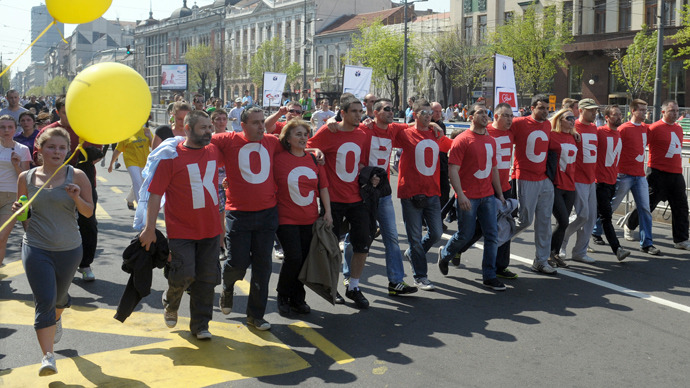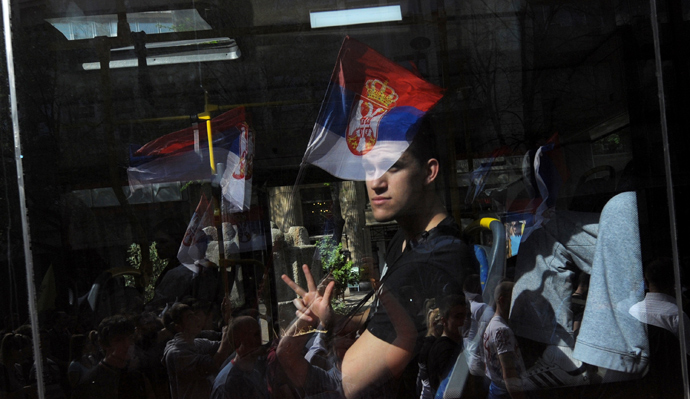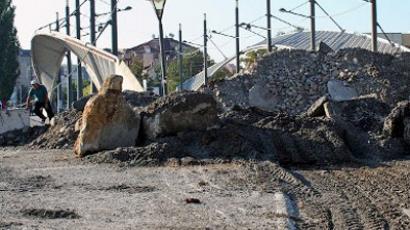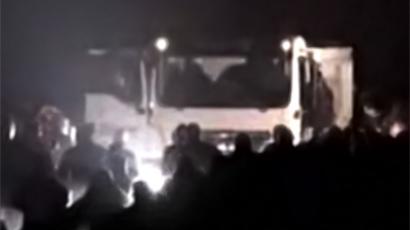Kosovo resolution? Serbia govt approves recognition deal
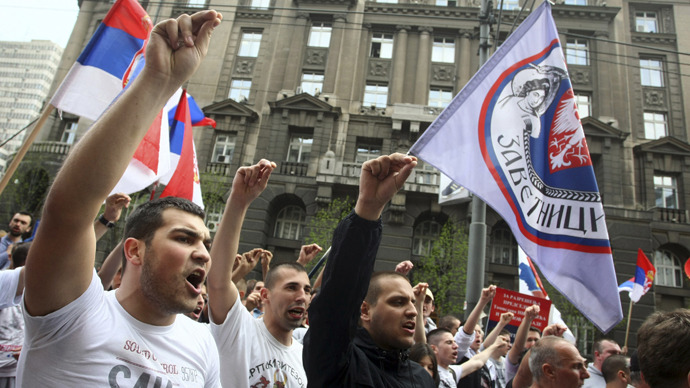
Serbia’s government has approved recognition of Kosovo in exchange for wide autonomy of Kosovo’s Serbs. The possible compromise deal on the breakaway province status triggered wide-scale protests in both Belgrade and Pristina.
The EU-mediated negotiations between Serbian Prime Minister Ivica Dacic and his Kosovo counterpart Hashim Thaci seem to have finally borne fruit. On the eve of the EU General Affairs Council’s making decision to start talks with Serbia on its ascension to the EU, official Belgrade put a toe in the water and pronounced the Kosovo deal as fait accompli.
A spokesperson of the Serbian government, Milivoje Mihajlovic, announced on Monday that the government ‘unanimously’ approved the pact stricken with Kosovo; and the ministries have already been ordered to implement the agreement.
According to Mihajlovic official Belgrade agreed to recognize the authority of ethnic-Albanian Pristina over the runaway state in return for wide autonomy of the Serbs minority within Kosovo.
Boyan Birkich, foreign affairs editor for Serbian Public TV, told RT that the deal is not an official recognition of Kosovo's independence.
“Officially it does not give independence. Serbian leaders insisted that in one of the articles which said that Serbia will not block the membership of Kosovo in international organizations, was changed to - Serbia will not block Europe in the integration process of Kosovo. It doesn’t say ‘international organization’ any more. So Serbia may still continue to block, with the main ally in the security Council Russia, the membership of Kosovo in the UN. So in that fact also Serbian leaders see that they have managed to avoid that recognition of Kosovo.”
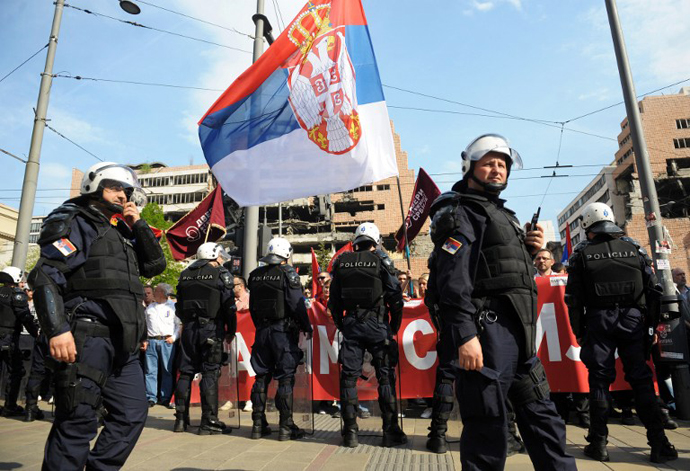
Serbia’s parliament has not even commenced discussion of the
agreement; the vote is to take place later this week. Serbia’s
deputy Prime Minister Aleksandar Vucic, the leader of Serbian
Progressive Party, says a national referendum would possibly be
needed to get final approval.
But the news has had an effect on the EU Commission in Luxemburg, which has recommended member states to start negotiations with Serbia on EU membership. However, public in both Belgrade and Pristina reacted angrily.
On Monday thousands of Serbs marched the streets of the capital Belgrade chanting ‘treason’ and demanding the current government to resign. Protests, which began on Sunday, are scheduled in the run-up to the parliamentary special session on the deal.
Nikola Marinkovic from the Serbian movement against the EU accession told RT that the Serbian people don’t interpret the agreement with EU as a ‘diplomatic victory’.
“Our movement sees this agreement as a betrayal of Serbian national interests and the Serbian national state as well. And most of the Serbian people share our opinion. But media in Serbia is under cover, they want to deceive our people. They tell us that this agreement is our diplomatic victory, but it is not so.”
He adds that there is no prospect for Serbia in the EU. “The EU doesn’t want us in Europe, they want our resources, our money, our territory”
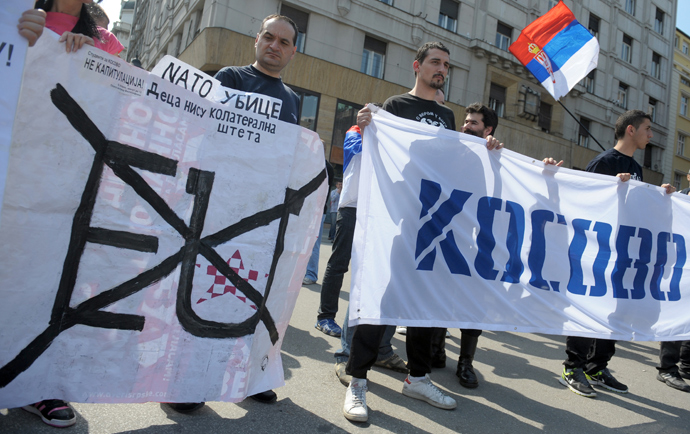
Serbia’s Orthodox Church has also accused the government of surrendering Kosovo in exchange for the carrot of possible EU membership.
“This appears to mark the pure surrender of our most important territory in spiritual and historical terms,” said Patriarch Irinej, the head of the Serbian Orthodox Church, in a statement.
But most analysts believe that so-far the Serbian government has
the balance of public opinion behind the Kosovo deal.
In Pristina, where Kosovo's MPs hastily voted in favor of the agreement at an urgent session late Sunday, about 200 protesters rallied near the parliament decrying any kind of autonomy being granted to Serbs living in Kosovo for centuries. They claimed that the Serb minority in the north of the region cherishes plans to retreive its land from Pristina’s jurisdiction and reunite with Serbia.
The Kosovo accord is meant to end the partition, which currently
exists in Kosovo between the Albanian majority and about 50,000
Serbs, who live in northern Kosovo around the town of
Mitrovica.
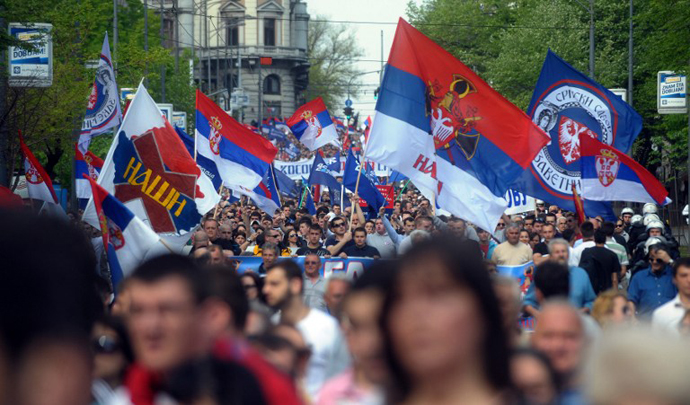
The enclave has largely functioned as part of Serbia since 1999 and even since Kosovo’s declaration of independence in 2008.
It’s an area bristling with weapons and animosity and the deal between Serbia and the EU could easily unravel if the Mitrovican Serbs resist.
As well as the rallies in Belgrade, a far larger rally of up to 5,000 Serbs protested Monday against the deal in Mitrovica chanting “Treason, treason!” and "No Surrender!”
The Kosovo problem finally being resolved has shadowed the fact that Kosovo Serbs have repeatedly warned they will never accept any authority coming from Albanian Pristina.
Kosovo Serbs have proven their decisiveness by constructing barricades to prevent Pristina authorities from entering their enclave since 2011. And even armed interference of the international KFOR forces - a branch of NATO acting as peacekeepers in Kosovo - has not changed that fact.
Ethnic Albanians got the upper hand in the region of Kosovo, where the Serbian nation was born in the Middle Ages, as a result of a NATO assault on Serbia in 1999. In 2008 Pristina declared unilateral independence that Belgrade once pledged never to recognize.
